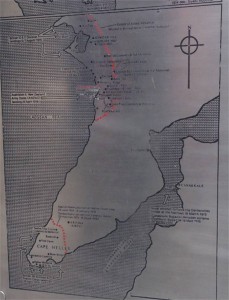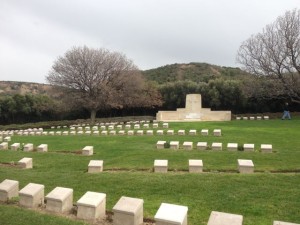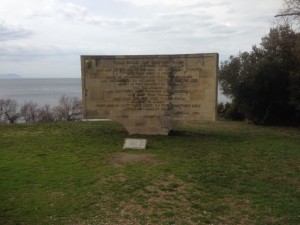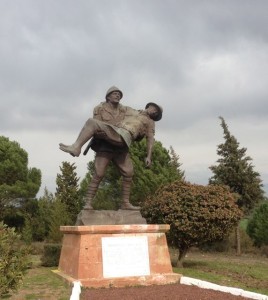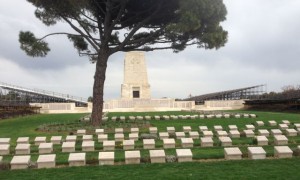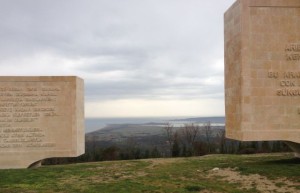Travel is always full of images that stick in your mind but that you don’t think to take photographs of—the crowded waterfront by the ferry terminals with everyone enjoying the unseasonably warm weather, the vendors selling chestnuts cooked on brasseries, men carrying trays of tea in the Bazaar and on the street, dogs curled up and sleeping on the street (Ellie heard that pets are considered dirty but also good luck, so the dogs are feral but tolerated), and above all, the women in their head scarves of every imaginable color and style.
Here is the map of the towns we will visit.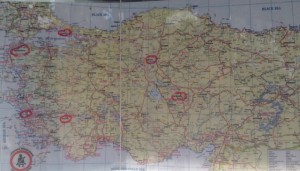
As we drove out of town, which took over 45 minutes as we drove through a sea of high rises, Serdar gave us a history of Turkey from the paleolithic period to the present and an overview of Turkish economy (17th largest in world), all of which I’ll spare you.
Our destination today is Gallipoli.
Serdar explained that the significance of the battle of Gallipoli, aside from its being the costliest single battle of WW1, 130,000 dead, is that it is the birth of the Turkish independence movement and the Australian and New Zealand independence movements as well. As a result of the battle, Mustafa Kemal, the leader of the Turkish troops realized that the Ottoman Empire was moribund and needed to be replaced, and he led the independence movement and founded the Turkish Republic in 1923. He became known as the Ataturk, the father of Turkey.
But back to Gallipoli. In WW 1, the Ottoman Empire was neutral but on friendly economic/trading terms with Germany when Germany asked to bring a battleship through the straights of Dardanelle. Turkey agreed, telling them to hoist the Turkish flag. Turkey tried to appease the Allies by telling them that they had bought the ship. The German battle ship sailed through Bosporours Straight into Black Sea and attacked Russia. As a result, Russia declared war on the Ottoman Empire. The Allies planned to sail through Dardanelles and take Istanbul, but Germans spread nets of mines across straights, and many ships were lost. Churchill decided the Allies needed to take the hills overlooking Dardanelles in order to allow ships to sail through. The plan was for each group to land and join forces on the beach and take the hill occupied by Turkish forces. The buoys that were supposed to show troops where to land must have been blown off course by strong winds, which on the basis of our day here, I can say are clearly common. The British landed on the north end of the peninsula, but were too far away to aid the other troops; the Australians landed at Anzac Cove and gained the hill but were stopped and dug trenches 8-9 ft from Turkish troops. New Zealanders were sent as reinforcements but they too landed in the wrong spot and were surrounded by Turkish troops, so everyone was pinned down.
I didn’t expect today to be so moving, but when we stopped at Anzac Cove, and I saw the plain markers to the boys who died and read the words of Ataturk on a nearby monument, I was moved to tears.
Those heroes that shed their blood and lost their lives . . .
You are now lying in the soil of a friendly country.
Therefore, rest in peace.
There is no difference between the Johnnies
And the Mehmets to us where they lie side by side
Here in this country of ours.
You the mothers. . .
Who sent their sons from far away countries
Wipe away your tears.
Your sons are now living in our bosom
And rest in peace.
After having lost their lives on this land,
They have become our sons as well.
Ataturk 1934
The battle dragged on for eight months. The troops were so close that they would call a truce to do laundry or to trade food, or on Christmas day, to play soccer.
One monument is of a Turkish soldier carrying Australian soldier back to his line.
No one won the battle. The Allies eventually withdrew.
What is so amazing about this site is that all sides mourn the pointless loss of life and recognize the heroism of the troops on both sides. Both sides will join in the commemoration of the 100 anniversary of the battle on April 25th of this year. Preparations are underway for a huge celebration of the event.
All one can hope is that we learn lessons from such pointless loss of life.
After Germany lost the war, Turkey was divided up –the Greeks were given the land on the Aegean, the French and Italians were given the south coast. Kemal later known as Ataturk gathered support to fight against occupation. French and Italians withdrew but Greeks




